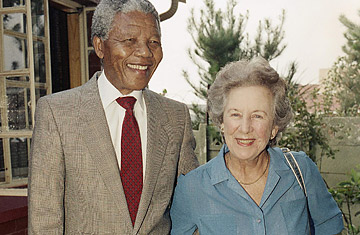
Veteran anti-apartheid ex-member of Parliament, Helen Suzman, right, holds hands with recently released ANC leader Nelson Mandela in 1990. Suzman died at the age of 91.
Helen Suzman, who was buried Sunday after dying at 91, was a lifelong contrarian. Born into white privilege in a society that was becoming progressively more racist, she served as a lawmaker in South Africa's parliament from 1953 to 1989, fighting government repression of the country's black majority and the imprisonment of Nelson Mandela and his fellow anti-apartheid fighters. For 13 years, from 1961 to 1974, it was a battle she fought alone as the sole anti-apartheid member of South Africa's parliament.
To the fury of many other anti-apartheid activists, however, she opposed the central plank of the worldwide anti-apartheid campaign — economic sanctions against South Africa — arguing that they hurt blacks more than whites. And while she earned the admiration and friendship of Mandela — in 1997 Mandela praised her "courage born of the yearning for freedom" and "hatred of oppression, injustice and inequity whether the victim be oneself or another" while awarding her a gold medal of honour — she did not flinch from criticizing his African National Congress (A.N.C.) once they won power. (See pictures of Mandela at 90.)
I met Suzman for tea in her lush garden in her Johannesburg home in June last year. She was, she said, "slowly fading away," tinnitus in her ears making her head "ring like a church bell." But, as I hoped, she was still feisty and outspoken. We chatted about the old days, about how she had managed to negotiate a visit to meet Mandela in prison on Robben Island off Cape Town in 1967, about what had made him such a unifying leader. Inevitably, that drew comparisons with today's A.N.C. "[Thabo] Mbeki [Mandela's successor as president, who was forced out of office by his own party] has made so many bad decisions," she said. "It's been an enormous disappointment."
She listed Mbeki's questioning of the link between HIV and AIDS, his inept ministers, corruption that she said "was everywhere you look," his support for Zimbabwean dictator Robert Mugabe ("so distressing") and the black empowerment program which, while intended to help those discriminated against under apartheid, has, she claimed, succeeded only in making a few of the politically connected very rich, and had "driven one million white South Africans out of the country, skilled people we needed."
"Power does funny things to people," she said, "and the leadership of the A.N.C. went in the wrong direction. There was this thirst for revenge. And so it's all still based on color. People now wonder what the point is of educating their children to be a doctor or an engineer if the job will go to someone less qualified. They [the A.N.C.] have been unable to move on from the past: everything has a racial background. If I criticize Mbeki because of his disastrous policies on AIDS, it is because I am a racist."
What Suzman found most inexcusable was how the party that was supposed to transform the lives of black South Africans had failed so miserably at its primary task. "There are miles and miles and miles of shantytowns today, many more than before," she said. "No running water, no sewerage, nothing. There are, yes, a handful of extremely rich people whose lives have changed dramatically. But the vast majority have been left behind. Unemployment is 26%. And we have a serious crime problem, and the link is clear: people are getting fed up with this non-delivery of policies, and understandably so."
A few months after we spoke, Mbeki was fired by the A.N.C. and the party split in two. In a general election due in a few months, the A.N.C. will face its most formidable array of opposition parties to date. It is a development that would undoubtedly please Suzman. Even so, her passing — and the memory of her lifelong struggle as peaceful objector — casts all of today's South African politicians in a less than flattering light. Even faced with a stronger opposition, few doubt that the next South African president will be Jacob Zuma, the A.N.C. president, and a man who has been tried and acquitted of rape and has faced persistent allegations of corruption. Would he do any better than Mbeki, I asked? Unlikely, thought Suzman. "Nobody knows what he wants," she said. "He just tells people what they want to hear." The contrast to Suzman herself could not have been greater.
